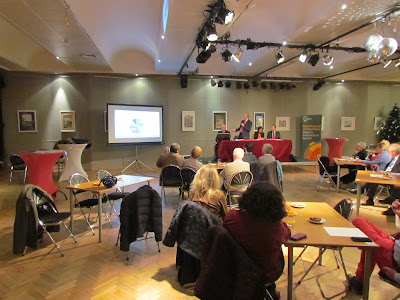Following the Brexit referendum in June 2016, attitudes have been divided over the impact this may have on scientific research both in the UK and Europe. While the British government has promised to guarantee funding for existing EU projects, potential future collaborations with EU scientists still hang in the balance.
The introductory presentations focused on the role and opportunities for chemical sciences in the Commission’s Horizon 2020 successor that has the working title FP9 and addressed the range of research fields and schemes that the European Commission and European nations currently organise. The speakers also gave their views on where the UK fits into this in a (presumably) post-Brexit future.
Presentations
Our first speaker was Prof David Cole-Hamilton (second left above) who is President of the European Association for Chemical and Molecular Sciences (EuCheMS) and Irvine Professor of Chemistry at the University of St. Andrews. His presentation can be accessed here.
The RSC line was then put by Dr Mindy Dulai (second right above), Senior Programme Manager (with responsibility for Brexit issues) at the Royal Society of Chemistry HQ in Cambridge, UK. Mindy has worked in many areas of the RSC and was been a Programme Manager in Environmental Sciences and also Physical Sciences, before her current role. The RSC response and priorities for Brexit are outlined here.
Finally Dr Peter Chisnall, Business Process and Risk Management Coordinator at the EUREKA Secretariat in Brussels (standing right above) gave his view of the situation from the point of view of a independent pan-European research network. Peter's presentation can be accessed here.
The event was moderated by Tim Reynolds, Chair of RSC Belgium.
Debate
The floor was then open to the audience and an extensive question and answer ensued that lasted for over an hour. Questions which were explored included: 'How can we improve EU collaborative research in this field in the next FP?', 'How can UK chemical scientists remain involved and contributing post-Brexit?' and 'What new forms of collaborative structures are required? 'As with our previous debates the audience was seated in a café-style format (small tables with 6 seats) and a bar and light refreshments/nibbles were available throughout the event and afterwards.



No comments:
Post a Comment
Note: only a member of this blog may post a comment.